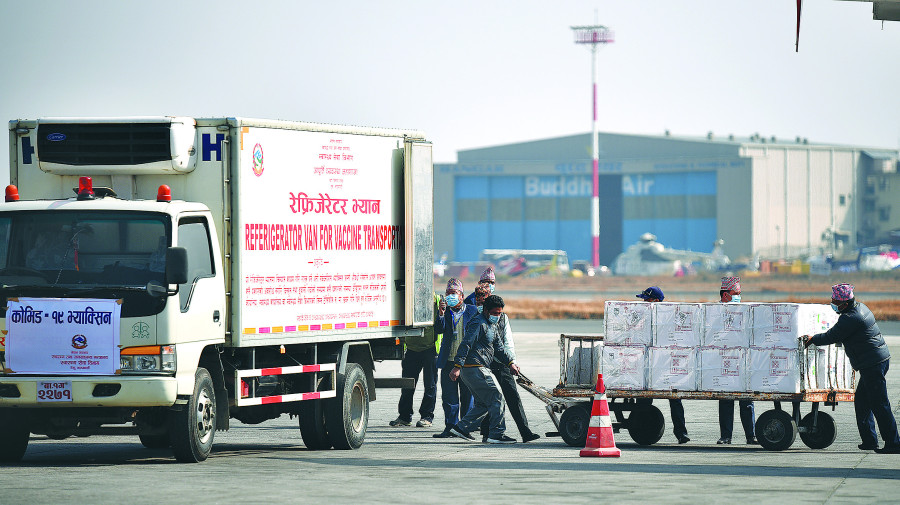Money
Nepal negotiating with Asian Development Bank for $150 million aid to procure Covid-19 vaccines
The World Bank has announced a $75 million loan to Nepal for the immunisation drive. With the economy hit by pandemic for more than a year, the government is struggling to collect revenues.
Prithvi Man Shrestha
After the World Bank approved credit to Nepal to procure Covid-19 vaccines, the government is now negotiating with the Asian Development Bank to get additional financing for the same purpose, two officials of the Finance and Health ministries said.
On March 18, the World Bank had announced that its board approved $75 million (Rs8.72 billion) loan to Nepal to help the country to procure Covid-19 vaccines and to help Nepal to strengthen the health system to support the Covid‐19 vaccination effort and procure other Covid‐19-related supplies such as diagnostic tests, laboratory equipment and therapeutics.
With the government struggling to collect enough revenue due to reduced economic activities caused by the pandemic it wants additional assistance Asian Development Bank (ADB) to procure vaccines.
“We are discussing with the ADB to secure aid of $150 million (Rs17.44 billion) in order to purchase the Covid-19 vaccine,” said Jageshwor Gautam, spokesperson at the health ministry, who is also coordinating the negotiations with the multilateral donor. “We are yet to reach any conclusion on the matter.”
A senior official at the finance ministry on condition of anonymity, because he is not authorized to speak to the media, confirmed the size of aid being negotiated with the ADB.
“But, actual aid to be provided by the ADB will be determined once the negotiation concludes,” the finance ministry official said.
Shreekrishna Nepal, chief of international economic cooperation coordination division at the Finance Ministry said that the Health Ministry was currently in negotiation with the ADB to prepare the project documents.
Once the project document is prepared, the finance ministry gets involved in further negotiation, according to Nepal.
According to the Health Ministry’s estimate, the country needs Rs48 billion to procure the Covid-19 vaccine.
Even though the government has already initiated the vaccination campaign starting from January 27 with both donated and procured vaccines, the government officials said the expenses made to buy vaccines would be reimbursed by the World Bank and Asian Development Bank.
“The project has been designed in a way that the donors can finance the procurement of vaccines retrospectively,” said Nepal. In April last year, the World Bank had approved the aid of $29 million under its Covid-19 Emergency Response and Health Systems Preparedness Project.
The ADB in May last year approved a $250 million concessional loan to help the government fund its response to Covid-19. In June last year, the ADB approved a $3 million grant from its Asia Pacific Disaster Response Fund (APDRF) to further support Nepal in its fight against the Covid-19.
The World Bank and ADB have been the largest two donors for Nepal for the last several years and both of them have increased their lending to Nepal substantially in recent years with disbursement of Rs528.31 million and Rs292.48 million respectively in fiscal year 2018-19.
According to Gautam, the Health Ministry is also in talks with the KfW Development Bank of Germany to receive credit for procuring the Covid-19 vaccines and developing health facilities.
“I cannot confirm the actual amount of credit being negotiated with the German bank right now,” said Gautam. “Our negotiation with the German bank is close to a conclusion.”
The Finance Ministry has been assuring that there will be no shortage of resources for the vaccination drive. It has been saying that it would manage the resources for purpose either domestically or from the external resources. As a part of generating external resources, the government had sought resources from foreign donors.
According to the World Bank, of its latest $75 million, 90 percent will go for purchasing the vaccine while the rest will go for strengthening the health system to support the Covid-19 and procure other Covid‐19-related supplies.
Besides getting resources for procurement of vaccines from donors, the country is also set to get vaccines free of cost required for 20 percent of the population under the COVAX facility, an international initiative co-led by the World Health Organization and partners to ensure equitable global access to Covid-19 vaccines.
In early March, Nepal received delivery of 348,000 doses of Covid-19 vaccine under this facility.
According to Gautam, Nepal is supposed to receive 13 million doses of vaccine under COVAX facility as a whole to meet the vaccine needs for 20 percent of Nepal's estimated 30 million populations.
In January, Nepal received one million doses of Covishield vaccine donated by India with which the government started the first phase of vaccination campaign on January 27. Under the first phase, a total of 438,000 people including health workers, sanitation workers, journalists and others were inoculated.
On February 21, Nepal received one million doses of Covishield vaccine bought by the government from Serum Institute of India and the government started the second phase of vaccination drive on March 7, targeting the people aged 65 years and above. In the second phase, over 1.35 million people were vaccinated, according to the Health Ministry.
The government and Serum Institute of India had signed a procurement agreement for two million doses of vaccine. But, the company has delayed supplying an additional one million doses of vaccine.
Meanwhile, the 800,000 doses of vaccine donated by China is arriving in Nepal early this week.
Chinese ambassador to Nepal Hou Yanqi wrote on twitter on Saturday, “The 800,000 doses of China aid Covid-19 vaccine to Nepal have arrived at Beijing Capital International Airport. They are coming very soon.”




 12.62°C Kathmandu
12.62°C Kathmandu














